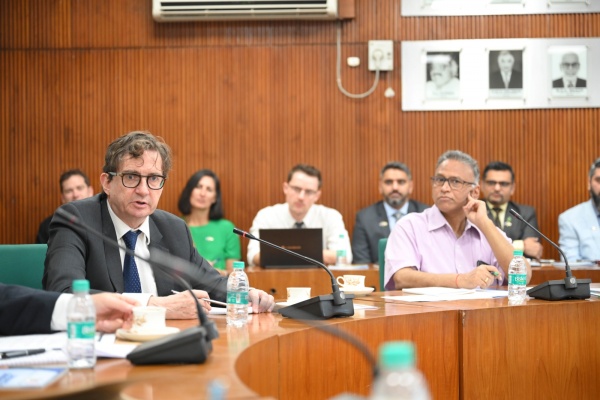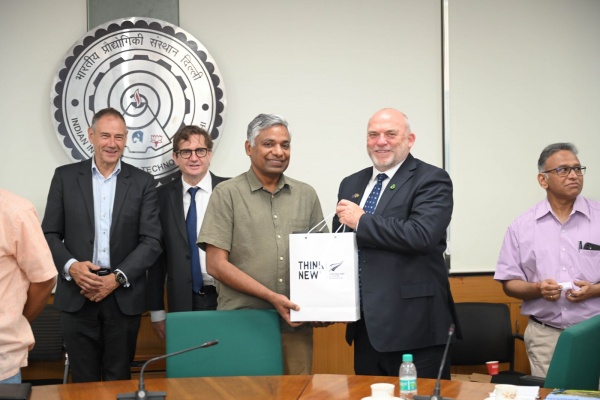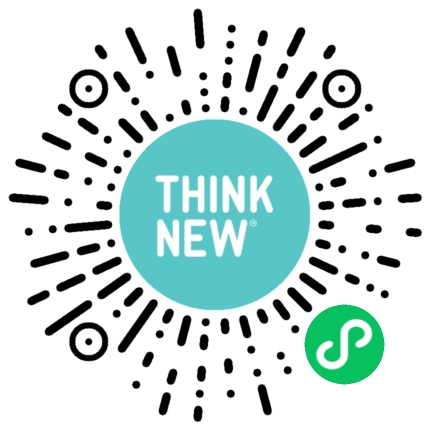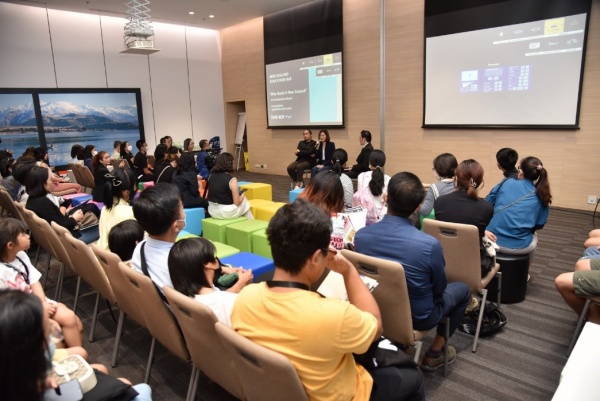Search
Showing 10 of 1193 results for Value-priced treatments https://simplemedrx.top
-
We’re on the way back
ENZ’s Director of Insights, Marie Clark says interest in New Zealand as an education destination remains high, and the numbers contained in the April 2023 Insights Story back her up.
- Traffic to the Study with New Zealand website leapt from 75,000 users in November 2022 to 295,000 users in February 2023.
- At the beginning of March there were nearly 34,000 international student visa holders, up 98% since our borders opened.
- Overall application approvals return to around two thirds of pre-pandemic levels
In December 2022, ENZ moved into Phase 2 of the I AM NEW campaign. This involved moving to an ‘always-on’ approach that focuses on the individual stories of the students involved in the campaign which targets potential international students and their parents across 10 markets. With a mix of paid digital advertising across Google, Facebook, Instagram, YouTube, TikTok, DV360, WeChat and Bilibili, the campaign reached an audience of 57 million outside China and a further 19 million within China. Clicks on the campaign’s digital advertisements totalled 1.2 million and 109,000 respectively.
New Zealand’s largest source of international students also comes into the spotlight with an updated China Insights dashboard which presents key data and commentary to help readers understand the current state of the market. Other insights contained in the report highlight:
- international education competitor destination growth in 2022,
- agents’ perspectives of New Zealand, and
- analysis of the potential for older professionals whose focus on learning to help their career success is balanced by their preference to continue this study from within their home country.
Included in the report is analysis of domestic perceptions of how beneficial international education and students are to New Zealand, and newly released analysis of the broader impact of the sector on the New Zealand economy and communities.
The full Insight Story for April 2023 will be available on Intellilab shortly. You can sign up to Intellilab here.
-
High-level delegation visit strengthens education relationship with India
The New Zealand India Education Week – held from 17-22 April – included senior level participation from New Zealand universities and was designed to further strengthen the strategic education partnership with India.
Education New Zealand Manapou ki te Ao (ENZ) Chief Executive, Grant McPherson, led the delegation across New Delhi, Mumbai, and Chennai.
Demonstrating New Zealand’s overall commitment to India, New Zealand announced an investment of $400,000 towards internationalisation and student mobility initiatives, including the relaunch of the New Zealand Excellence Awards (NZEA).
The NZEA are unique scholarships designed exclusively for Indian students that are jointly funded by ENZ and all New Zealand universities. Since their launch in 2016, the scholarships have enabled more than 200 Indian students to study at one of New Zealand’s universities.
Another key focus for the week was to re-engage with the New Zealand Centre at Indian Institute of Technology (IIT) Delhi and discuss the future trajectory of the partnership.

New Zealand High Commissioner to India His Excellency Mr David Pine speaking at a meeting with the Indian Institute of Technology Delhi.

Caption: Education New Zealand Manapou ki te Ao Chief Executive, Grant McPherson (right), thanking Indian Institute of Technology Delhi (IITD) outgoing Dean International Naveen Garg (left) for hosting the NZ delegation at IIT.
Erik Lithander, Deputy Vice Chancellor Strategic Engagement at the University of Auckland, signed an MoU with IIT Delhi on behalf of all New Zealand universities to continue the relationship and further develop the New Zealand Study Centre.
The New Zealand Study Centre was inaugurated at IIT Delhi in February 2020 by Deputy PM Winston Peters, demonstrating the importance of education as a key part of the India-New Zealand relationship.
The week was bookended by two education agent fairs in New Delhi and Mumbai respectively, both of which exceeded expected student attendance numbers.
Speaking at a media briefing held at the New Zealand High Commission in New Delhi during the New Zealand India Education Week, ENZ CE Grant McPherson underlined the importance of New Zealand’s education partnership with India.
“India is one of New Zealand’s priority partner countries for collaborations, exchanges, and student mobility. We are excited that the announcements around the New Zealand Centre strengthening and the extensive package of scholarships under the New Zealand Excellence Awards scheme will further engagement with India,” Grant said.
ENZ Regional Director – Asia, Ben Burrowes, said with the sector’s focus on recovery and reconnections, the New Zealand India Education Week provided a great opportunity to refresh relationships with education sector stakeholders in India.
“India has always been a strong partner to New Zealand in the education space, and students from India consistently make up the second largest portion of international students studying in New Zealand.
“We are delighted for the opportunity that the New Zealand India Education Week offered us to reconnect and refresh our education links with India, and we look forward to building this relationship further over the coming years.”
Additional info –
To begin the week, sector representatives were provided with in-depth insights into the India-New Zealand relationship from High Commissioner David Pine, ENZ in-market staff and a consultant from EY. Representatives attended meetings with government departments such as the University Grants Commission (UGC) as well as B2B institutional networking events to support their university's global engagement. The delegation also met with two Indian Institutes of Technology (IIT), IIT Delhi and IIT Madras.
-
Celebrating the 28 Pasifika graduates of the He Manawa Tītī Programme
He Manawa Tītī was a 13-week bespoke training course for emerging Pacific leaders delivered between February and May 2023 under the Manaaki New Zealand Scholarship Programme (MNZSP). The name He Manawa Tītī stems from a Māori Whakataukī (proverb) meaning ‘stout of heart’ and the course formed part of the Ministry of Foreign Affairs and Trade (MFAT) contribution to the suite of reparations for Pacific peoples announced in 2021 by the New Zealand Government. The press release announcing these scholarships is available here).
Emerging leaders (aged 25 – 35) from public, private, and voluntary sectors took part in the course combining academic and experiential training. Scholars participated in several weeks of online learning from their home countries and spent nine weeks of the programme based in Te Whanganui-a-Tara Wellington. He Manawa Tītī included modules on good governance and public sector leadership, trade policy in the context of the Pacific, and explored Pasifika values as key tenets of modern leadership.
Education New Zealand Manapou ki te Ao (ENZ) was involved in this kaupapa (programme of work) through its partnership with MFAT on the operational management of the MNZSP.
“It was fantastic to be able to celebrate these 28 inspiring young leaders as they completed this programme in Wellington last month. In true Pacific style, there was plenty of laughter, fun and colour, and it was a fitting celebration for all that these graduates have already achieved throughout their education and early careers,” said ENZ’s General Manager International, Lisa Futschek.
“The programme was designed by MFAT in collaboration with key Pasifika stakeholders and community members, highlighting Pasifika ways of learning and recognising the knowledge that is already held by Pasifika peoples. This collaboration also ensured opportunities for the scholars to build networks with Pasifika communities here in Aotearoa New Zealand, which connects them to our country now that they have returned home,” Lisa added.
The Manaaki New Zealand Scholarship Programme is part of the International Development Cooperation support that MFAT provides for developing partner countries across the globe. Manaaki alumni are well-known to be integral contributors to the development of their home countries.
“These Pacific emerging leaders are enthusiastic about returning home and putting into practice the leadership skills they have gained in Aotearoa,” said MFAT Lead Adviser, Alexandra Grace.
“While they have successfully completed this bespoke cohort course, real success will be demonstrated over coming years through what they achieve for their communities and countries. Scholars told me they won’t miss the weather (!) but will take with them enduring memories of the manaakitanga they experienced in our country.”
-
Individual Prime Minister Scholarships for Asia and Latin America applications open 24 July
The Prime Minister's Scholarships are funded by the New Zealand Government and administered by Education New Zealand Manapou ki te Ao (ENZ) to support New Zealanders on learning experiences in Asia and Latin America. Flexible funding is available to support both short and long-term programmes including study abroad / exchange, internships, postgraduate study, and language programmes.
Prime Minister Scholarships are for all New Zealanders, and we welcome applicants from all walks of life and backgrounds. We're looking for New Zealanders who are passionate about global citizenship, can represent Aotearoa New Zealand overseas, and want to create positive change in their communities.
Information, alumni stories, resources and application instructions can be found on our scholarships website. The application site will go live from 24 July.
Specific enquiries or questions can also be emailed through to ENZ’s scholarship team – scholarship@enz.govt.nz or potential applicants can sign up on our scholarship page to stay updated about this scholarship round and to find out when future information sessions and workshops will be held.
Please pass these dates on to your networks.
-
NauMai NZ has a brand-new look
We are excited to share that NauMai NZ, ENZ’s student experience digital platform, has undergone a refresh and has a new look and feel, bringing it in line with the wider ENZ brand family. Check out its new look here.
NauMai NZ provides clear, timely information and advice about the things that international students want and need to know - arriving in New Zealand, study and education, health and wellbeing, New Zealand and Māori culture, exploring New Zealand, making friends, safety, money, work, and much more. It links to expert resources where appropriate and is designed to complement information provided by education providers.
NauMai NZ was launched four years ago and since then has had one million page views.
Student Experience Manager, Ross Crosson says the aims and objectives of NauMai NZ have not changed.
“NauMai NZ is still about providing trusted, accurate information to support student wellbeing, bridge the gap between expectation and reality, enable social connection, and improve student experience outcomes. The revamp is about being responsive to the needs of a wider range of students who are studying with New Zealand, not just in New Zealand” he adds.
Alongside the new look, new content has been added including,
- Life on campus (orientation, clubs, student associations)
- How to maximise your experience (goal setting and support options)
- Road safety
- Outdoor safety (including water safety, hiking and tramping, hunting/mahika kai)
- Online study for offshore students
- Global Pathways
“Just as we have over the past four years, we will continue to add new content to NauMai NZ to meet student need and expectation. The site is always evolving and feedback is welcome” Ross says.
Should you have any questions, please don’t hesitate to contact Ross, ross.crosson@enz.govt.nz.
-
Applications and nominations for the Impact Awards are open until Sunday 23 July
The Impact Awards celebrate young New Zealanders aged 16–30, who are making a difference for our communities, country and beyond. This includes those with NZ citizenship, permanent residence or other visa for five years or have the right to work/study in NZ and have been here for two years.
This year there are five different award categories - climate, enterprise, inclusion, wellbeing, and local impact categories. Applications can be made either as an individual or a group, or you can nominate someone you know.
The Awards are run by Inspiring Stories, a kiwi charity that believes in the power of young people to create change. More information about these awards including links to the application and nomination forms can be found here The Impact Awards — Inspiring Stories
-
Changes to the New Zealand Traveller Declaration Process
Travellers arriving into Auckland, Wellington, Christchurch and Queenstown Airports can now complete a digital declaration. Everyone travelling into New Zealand needs to complete a New Zealand Traveller Declaration (NZTD).
The NZTD collects travel, customs, immigration and biosecurity information and aims to improve the safety and security of New Zealand.
It’s free and needs to be completed for each traveller, including babies and children.
Key information about the online declaration process:
- Everyone travelling into New Zealand needs to complete a declaration.
- It is free and you can do it on the online form or the NZTD app.
- A declaration needs to be completed for each traveller, including babies and children.
- You can start your digital declaration at a time that suits you. The earliest time you can submit your declaration depends on whether you are travelling by air or sea.
- Your declaration is linked to your passport and is checked when you arrive at the eGate or by a border officer.
- There is a paper declaration form available for travellers who cannot complete it online.
- If you are a New Zealand visa or NZeTA holder, you still need to complete an NZTD as well.
For more information and to access the form, please visit this website: New Zealand Traveller Declaration
-
NZ Police Ethnic Services Teams supporting international students with local safety advice
Over the past twelve months, Aotearoa New Zealand has seen a welcome return of international students to our communities and our education providers. NZ Police Ethnic Services teams around the country, including in Tāmaki Makaurau Auckland, and at Lincoln University, have been busy engaging with international students in a variety of ways.
In Tāmaki Makaurau Auckland, Ethnic Liaison Officers, Constable Takashi Endo and Constable Kevin Deng, have been delivering presentations to secondary and tertiary international students on a range of safety related topics - informing them and supporting them to have a successful time living and studying in their host city.
The team has seen a great response to the presentations and due to the high demand, has also developed a “Train the Trainers” programme, designed to equip education providers themselves to deliver introductory safety training to their students. The first ‘Train the Trainers' session was recently delivered by Constables Endo and Deng to staff from over 20 education providers in Tāmaki Makaurau Auckland. The session covered a range of topics including personal safety, road safety, family harm, hate crime/incidents, alcohol/drugs and water safety.
Constable Endo said that he was encouraged to see so many school representatives at the training session and they were very interested in the topics covered, following up with many useful questions.
He also said, "This training session is not going to be a one-off, and we will also continue to visit schools and speak with international students when required. Our aim is to ensure students and school staff have a greater understanding of safety and safety issues here in Tāmaki Makaurau Auckland.’
Following the training day, both constables will attend education provider seminars as observers to ensure staff are supported and equipped to deliver these safety sessions.
Melody Hao, International Coordinator – International Business/Student Support at Unitec Insitute of Technology, expressed the gratitude of her team to the Ethnic Services Team following their presentation at Unitec’s International Orientation Day on Wednesday 19 July.
“The session delivered by Constable Endo was well-received by the 220 people that attended. In our post-orientation survey, 97.5% of respondents said they really enjoyed or enjoyed this presentation.
"Feedback from the student audience included that the session was full of useful safety information and that it was delivered in a fun and interactive way. Thank you to the team for such a wonderful presentation and for being so supportive to our international students as they embark on their international student experience with us here in Aotearoa New Zealand," added Melody.
Another recent safety initiative was delivered by Constable Deng alongside Massey University student representative, Jun Jiang. Together they delivered a ‘safety’ livestream via Education New Zealand’s Manapou ki te Ao (ENZ) NauMai NZ WeChat mini programme in July. NauMai NZ WeChat livestreams are an important channel where experts and students themselves address a range of topics relevant to Chinese students living and studying in Aotearoa New Zealand.
Constable Deng and Massey University international student representative, Jun Jiang following the delivery of a safety focused livestream on ENZ’s WeChat mini programme platform.
Faymie Li, ENZ's Senior Advisor, Student Experience said that the safety of our students is always front of mind.
“Looking after our students and equipping them with useful information that supports them during their time with us here in Aotearoa New Zealand is really putting into practice, Manaakitanga – the Māori value of hospitality, kindness, support, respect and care for others.
"These sessions conducted by the NZ Police Ethnic Services Teams are an important tool in helping ensure our international students have a positive experience while studying with us. The livestream had 186 people tuning in and since then it has been watched over 170 times. This demonstrates that such sessions are of great value to our students,’’ said Faymie.
The recording of the livestream is hosted on the mini programme and can be accessed by scanning the QR code below.

QR code to access ENZ’s NauMai NZ WeChat mini programme
Further information on the Tāmaki Makaurau Ethnic Services Team
The team works in partnership with ENZ, local consulates, education providers, the New Zealand International Students’ Association, and other student representatives, to support the wellbeing of international students in Tāmaki Makaurau Auckland. This partnership ensures information is shared, potential issues are anticipated and responded to where possible, and shared work initiatives delivered where appropriate.
-
Inaugural Chief Executive Grant McPherson moving on after 12 years of service
Grant has been in the role since ENZ’s inception nearly 12 years ago, leading the organisation’s development and growth to what it is today.
“Over the course of his leadership, we saw significant growth of the international education sector that saw it become New Zealand’s fourth-largest export earner pre-Covid.
“ENZ launched the “Think New” brand and received several international and local awards recognising achievements in public relations and marketing (including digital). We have been entrusted by our NZ Inc. partners with initiatives such as the Manaaki scholarships.
“Alongside the highs, Grant also led the efforts to help the sector manage the challenges brought on by the pandemic. He chaired the International Education Chief Executives' Group. Together with peers from other government agencies with interests in international education, the group helped to drive the Government's International Education Recovery Plan.
“If the New Zealand International Education Conference KI TUA in August 2023 was anything to go by, the international education sector is in good heart and energised to rebuild.
“I appreciated Grant’s support as I took on the Chair role earlier this year. The Board and I thank him sincerely for his service and wish him well,” Tracey said.
Grant says he is proud of the incredible work ENZ and the international education sector have been doing to take New Zealand education to the world, particularly how we have navigated the complex environment post the pandemic.
“It’s fantastic to see what ENZ and the international education sector have achieved in such a short span of time. It has been an amazing adventure made possible by the great people of this organisation and this sector, thank you,” he said.
Grant will finish his role in mid-November and Dr Linda Sissons has been appointed as Acting Chief Executive while ENZ undertakes the recruitment process for a new Chief Executive.
-
Thai interest in New Zealand as an offshore study destination is growing
The annual Education New Zealand Manapou ki te Ao (ENZ) Bangkok Fair took place on Saturday 26 August with 1,630 attendees visiting throughout the course of the day, a record number for the Fair.
Those who attended had the opportunity to talk to more than 50 education providers that were representing Aotearoa New Zealand education across the school, vocational, English language, and university sectors.
Ben McNally Burn, ENZ’s International Market Manager for Southeast Asia & India added that it was fantastic to see Thai interest in considering Aotearoa New Zealand as an offshore study destination growing.
“Having record numbers attend our Bangkok Fair this year demonstrates how important and reputable these fairs have become for prospective parents and students wanting to access reliable information directly from New Zealand education institutions.
“For our education partners, these events are so important for maintaining in-market credibility and reputation and we cannot underestimate the importance of keeping New Zealand front of mind. Especially in amongst accelerated competitor activities in Thailand including seminars and fairs hosted by Education USA, the Canadian Embassy, Austrade, and the British Council”, said Ben.
Ms. Kirsty Bundell, Assistant Director of Mathematics and Statistics at Avondale High School conducted five simulated classrooms to showcase hands-on New Zealand teaching and learning styles. Featured here is a class on Geometry - ‘SURFACE AREA OF 3D SHAPES’.
Feedback from the sector representatives was overwhelmingly positive, noting that not only was there a fantastic turn out of attendees but that prospective students had clearly researched Aotearoa New Zealand and its educational offerings prior to coming, which led to engaging discussions.
Anne Henwood, Director of International Students at Rosehill College in Auckland said that she was thrilled by the exceptional experience at the 2023 Bangkok Fair.
“The events proved to be an invaluable opportunity for New Zealand schools, fostering connections and opening doors to agents, parents and students seeking quality education. The events brilliantly showcased the diverse educational opportunities for Thai students in New Zealand.”
Garry Chronican, Director Pathway, University of Otago | Te Whare Wānanga o Otāgo also said that it was a pleasure to attend such a well-run and valuable event.
“The standard of advertising, communication, organisation and overall experience was outstanding. The events were well supported by education agencies – a testament to the excellent relationship ENZ staff have with local stakeholders”.

“Why study in New Zealand” special seminar held by key opinion leaders Choak and Suquan Bulakul. Their son is currently studying in New Zealand.
ENZ also delivered an agent seminar in Bangkok on 25 August, just prior to the Education Fair. The Bangkok Agent Seminar offered an opportunity for NZ institutions to reconnect with high performing Thai education agents. This event included market updates, networking opportunities, along with 1-to-1 meetings throughout the day.
Following the ENZ agent seminars and fair, the ENZ team partnered with local schools and agents to take part in three separate mini fairs and school roadshows across Thailand including in Chiang Mai, Phuket and Chonburi.
Any institutions looking to be involved in other ENZ organised fairs and events in the future in any of our markets, can do so by visiting ENZ’s events page here.

